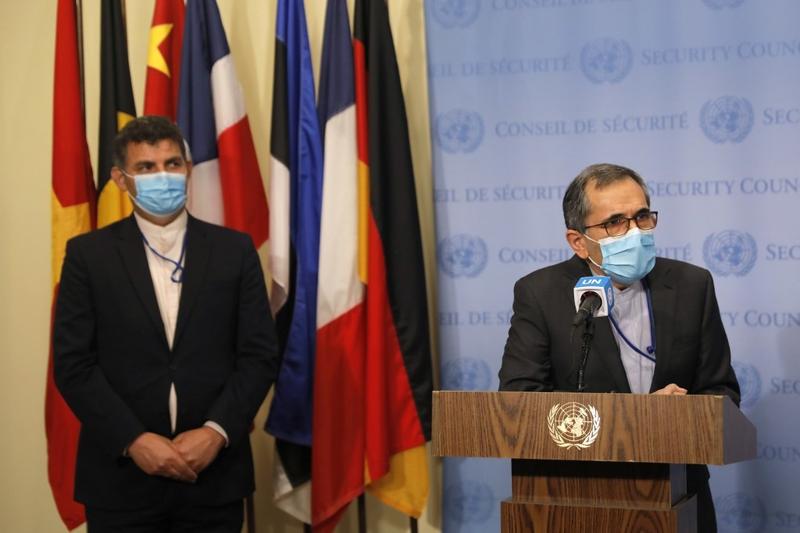 Iran's UN Ambassador Majid Takht Ravanch speaks to reporters after the US secretary of state (not in frame) urged members of the UN Security Council to restore sanctions against Iran following meetings at UN headquarters in New York, Aug 20, 2020.
(MIKE SEGAR / POOL / AFP)
Iran's UN Ambassador Majid Takht Ravanch speaks to reporters after the US secretary of state (not in frame) urged members of the UN Security Council to restore sanctions against Iran following meetings at UN headquarters in New York, Aug 20, 2020.
(MIKE SEGAR / POOL / AFP)
UNITED NATIONS/DUBAI - Iran denounced the United States' move on Thursday to restore UN sanctions on Iran, including an arms embargo, arguing Tehran was in violation of a nuclear deal it struck with world powers in 2015 even though Washington itself abandoned that agreement two years ago.
The United States submitted a letter to the 15-member UN Security Council accusing Tehran of non-compliance, starting a 30-day clock that could lead to a “snapback” of UN sanctions. Iranian Foreign Minister Mohammad Javad Zarif on Thursday said the US move was "unlawful."
All parties to the JCPOA, the Security Council member states and international jurists all share the view that the US is no longer a party to the JCPOA, and Washington's move has no basis as per the Security Council Resolution 2231 and the JCPOA.
Mohammad Javad Zarif, Iran's foreign minister
"All parties to the JCPOA, the Security Council member states and international jurists all share the view that the US is no longer a party to the JCPOA, and Washington's move has no basis as per the Security Council Resolution 2231 and the JCPOA," Zarif said in a phone conversation with UN Secretary-General Antonio Guterres.
JCPOA refers to the Joint Comprehensive Plan of Action, which is commonly known as the Iranian nuclear deal signed in 2015. The US government led by President Donald Trump pulled out of the deal in May 2018, triggering a tense standoff with Iran.
All the remaining parties to the nuclear deal - Germany, France, Britain, Russia and China - immediately notified the Security Council, in letters seen by Reuters, that they did not recognize the US move.
Germany, France and Britain on Thursday described the US attempt to trigger a sanctions snapback as “incompatible” with their efforts to support the already fragile nuclear deal, while Russia and China said it was “illegitimate.”

Reiterating that they remain committed to the JCPOA despite the significant challenges caused by US withdrawal, Germany, France and Britain said they "believe that we should address the current issue of systematic Iranian non-compliance with its JCPOA obligations through dialogue between JCPOA participants, including through the Joint Commission and use of the Dispute Resolution Mechanism."
Germany, France and Britain described the US move as “incompatible” with their efforts to support the already fragile nuclear deal, while Russia and China said it was “illegitimate”
China’s UN Ambassador Zhang Jun asked Indonesia, council president of August, “not to identify and circulate the US communication as a notification” to trigger the snapback process and to consult with all council members on how to proceed.
Earlier on Thursday Russia’s UN Ambassador Vassily Nebenzia rejected the US plan as “nonexistent.” Russia called for the council to meet on Iran on Friday but diplomats said that Washington blocked the request.
The United States acted after the Security Council resoundingly rejected its bid last week to extend an arms embargo on Iran beyond its expiration in October.
READ MORE: US bid to extend Iran arms ban suffers stinging defeat at UN
The pact aimed to prevent Tehran from developing nuclear weapons in return for sanctions relief and is enshrined in a 2015 Security Council resolution. Washington argues that it can trigger the snapback process because the resolution still names it as a participant to the nuclear deal.
Along with an arms embargo, a snapback of UN sanctions would include a ban on Iran developing ballistic missiles capable of delivering nuclear weapons and a halt to Iran’s nuclear enrichment-related and reprocessing activities
Along with an arms embargo, a snapback of UN sanctions would include a ban on Iran developing ballistic missiles capable of delivering nuclear weapons and a halt to Iran’s nuclear enrichment-related and reprocessing activities. Countries also would be urged to inspect shipments to and from Iran and authorized to seize any banned cargo.
Iran’s UN Ambassador Majid Takht Ravanchi said Tehran was confident that the Security Council would reject the US move.
READ MORE: Iran unveils ballistic, cruise missiles amid US tensions
Three senior Iranian officials told Reuters this week Iran’s leadership is determined to remain committed to the nuclear deal, hoping that a victory by Trump rival Democrat Joe Biden in the Nov 3 US presidential election will salvage the pact.
Biden, who was Obama’s vice-president, said he would rejoin the deal if Iran first resumed compliance.


